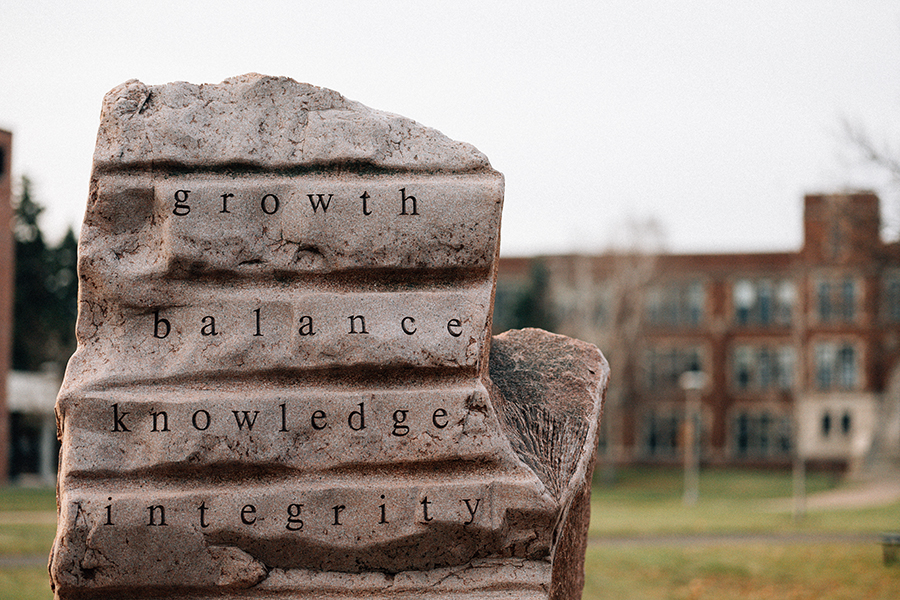TYPE
TOPIC
Taking stock of another’s health is a common human trait.
Saying “take care” to family member or friend is something most people say and hear multiple times a day. When it comes to our own care, it’s natural to wear a seatbelt in a car or apply sunblock when heading outdoors. Yet when it comes to our mental health, we aren’t always so quick to take care.
The University of Wisconsin-Superior, the Duluth Superior Area Community Foundation, Miller‐Dwan Foundation, Essentia Health St. Mary’s Hospital-Superior, Superior Rotary and numerous additional community partners have come together to create a mental health initiative in Douglas County known as LiveWell! Northern WI.
This is part of a larger project driven by the Douglas County Mental Health Core Team, which includes representatives from UW-Superior, Essentia Health St. Mary’s Hospital- Superior, Superior School District, Amberwing and the Miller-Dwan Foundation. This planning process which has spanned months and is funded by the Miller-Dwan Foundation, is being led by a facilitation team consisting of Chrissy Barnard, NAMI Lake Superior South Shore, and from UW-Superior, Kennedy Fenster, Human Behavior, Justice & Diversity Department administrative assistant II; Laurel Eaton, assistant director of Institutional Research and Sponsored Programs and member of the Center for Research and Evaluation Services team; and Lynn Goerdt, Human Behavior, Justice & Diversity Department professor.
“This project is intended to benefit the campus, students, employees and the community,” said Goerdt. “It’s a great blend.”
Initial discussions started in the fall of 2021 when UW-Superior’s Harry Anderson, dean of students, and Randy Barker, director of health, counseling & well-Being, met with members of the Miller-Dwan Foundation to express the extent that Douglas County is particularly impacted by a mental health crisis. Anderson and Barker provided an understanding of the situation and wanted to know how UW-Superior could help.
“Randy Barker led us down a path of looking at mental health differently,” said Goerdt. “Society tends to think of mental illness. When we’re identifying who is at risk of suffering and being isolated and being at risk of suicide, it’s not necessarily people with diagnoseable characteristics of mental illness, it’s people that are isolated, that don’t have the skills to navigate life’s distress and it feels like everything is their fault or that society is judging them and a way that they don’t feel self-worth or a feeling of hope.
“We need to broaden who we connect with for mental health. Therapy is great, but not everyone can get in or have insurance. And the public perception doesn’t help.”
At that point, Goerdt, who has a background working in mental health community planning, was added.
“The team worked quickly understand the needs and the causes of the mental health crisis in Douglas County and then what we can do about it from a prevention side, a response side and try to do things that weren’t just traditional,” said Goerdt.
OUTSIDE THE BOX THINKING
Solving the mental health crisis in Douglas County isn’t simply a matter of adding therapists.
“Tripling the number of therapists – that’s not going to solve the problem and it’s not going to help everybody because that’s not what everybody needs,” said Goerdt. “Although we do need more therapists.”
Instead, the team is focusing on providing resources within the community. They have nine major strategies, a few of which they are calling, Live Well! Northern WI.
“We have a work plan and we’re tackling all these things so we’re not waiting for something big to be built,” said Goerdt. “What can we do now? Our overall project mission is to create an innovative holistic mental health project for people who are living, working and attending school in Douglas County. Everybody is intended to benefit from this project.”
On its website, the group has created a calendar of activities throughout the county designed to tackle the epidemic of isolation.
“COVID just of course made everything worse,” said Goerdt. “This strategy is intended to connect people, so they are less isolated. We organize activities to fit focus areas or other ideas we come up with.”
Activities have included both inside and outside events that have ranged from roller skating at World of Wheels in Superior to a community campfire in Solon Springs.
“We partnered with the Harbor City Roller derby team, which one of the members is a graduate of the social program at UW-Superior,” said Goerdt. “World of Wheels was very happy to have us there – they were delightful. We had the best night ever. It was very successful.”
As an incentive, Essentia provided funding through its Live Well 23 program. If individuals host or attend five activities by the end of December, they are eligible to receive wellness items such as a hammock and camping supplies to blankets and wireless speakers.
“Our goal was to get people to do something that they hadn’t done before,” said Goerdt.
LiveWell! Northern WI also provides welcoming and healing spaces. These public spaces are intentional for sitting and being with others in a way that invites contemplation and conversation. One such space, located in the Superior Library, features calming puzzles and conversation cards. The healing spaces project is funded in part by Essentia Health St. Mary’s Hospital- Superior.
The team will continue to strengthen its ties throughout Douglas County, build partnerships and explore more ways to improve mental health throughout the region.
“For me, this is the perfect example of the university working on community needs and using our expertise to solve problems,” said Goerdt. “Agencies within the community are working very hard, but it is hard for agencies to try multiple things that may not work. We can try things. If they don’t work, we won’t do them, but we’re trying. And we’re being very systematic about that. And that’s a benefit of having the university involved in complex community issues like this.”
